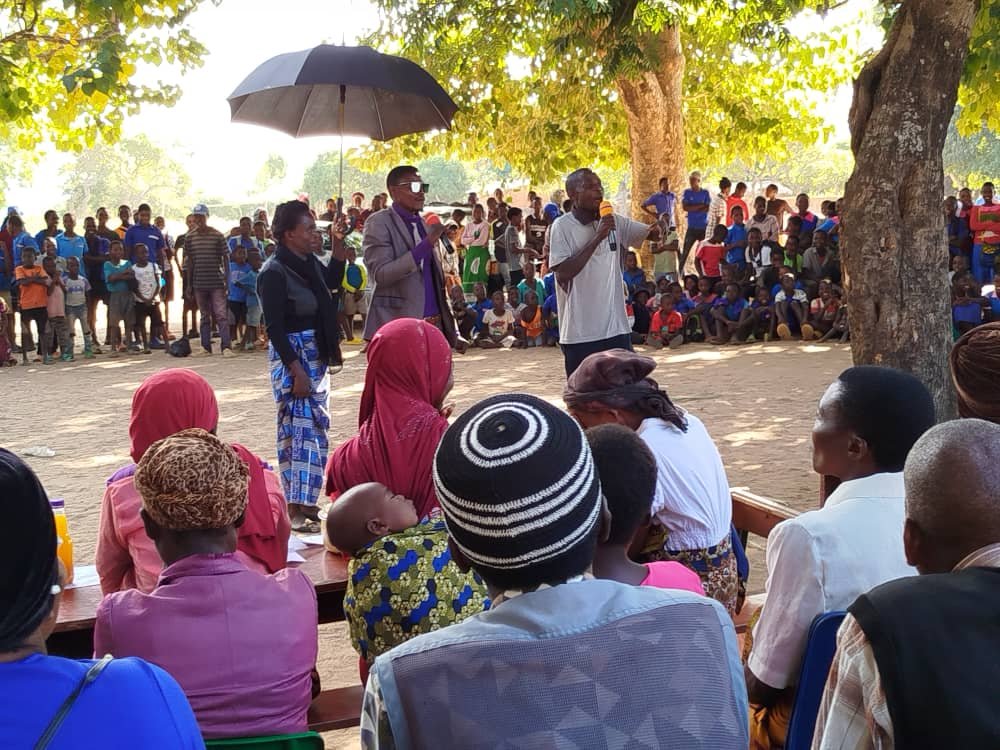Impact in 2024 and challenges ahead
Our HIV counsellor Bainatu working with girls near Songani
Looking back at all that Mbedza has achieved in 2024, we have much to celebrate.
2024 has seen Mbedza:
provide over 3300 HIV tests,
distribute over 46,000 condoms and develop sex and relationship eduction,
provide 750 girls with sanitary kits,
build 640 Esperanza Stoves,
plant over 35,000 trees,
support 60 children in Nursery Education,
support 88 orphans in Secondary Education,
operated HIV outreach programmes in the rural communities with the help of our Hope Ambassadors,
Very active library used by primary, secondary and college students
worked alongside Accomplish Children’s Trust to support children with disabilities in transforming lives.
Some of our students with a Gamba TinSmith stove - a portable improved cookstove.
We’re very aware that in our reporting through our social media we’re nearly always sharing good news and success stories. But behind those stories are many challenges and sometimes failures. This blog post shares some of those challanges and failures and also highlights where we are stretched.
From cyclones to inflation
2022 was a difficult year for Malawians. The war in Ukraine drove up maize and fertilizer prices, triggering high inflation rates of around 30%, with food inflation exceeding 40%.
In 2023, Cyclone Freddy devastated our communities, destroying homes and ruining their harvests.
In 2024, erratic rainfall led to another failed harvest. Many people—including several Mbedza staff members—were unable to harvest any crops.
We in the UK do not understand what it means to live with this kind of food insecurity.
In response, we have started experimenting with irrigation farming to provide maize for our staff and orphan education students. This year the price of fertiliser has got so high that it is difficult to see how many Malawians will afford without resorting to high interest loans from what we can only say are undesirable lenders.
A house destroyed by cyclone freddy although the Esperanza stove, built by Mbedza, remains undamaged.
Cultivating change
Paul Keeley from Sustainable Global Gardens with Richard Malili (Mbedza Environment Director) training farmers in sustainable garden projects.
As part of our environmental strategy, we have launched garden pilot programs in Monkey Bay and with our Hope Ambassadors in Zomba.
We have trained 20 people in soil conservation techniques and gardening with compost manure. Our goal is to develop a more sustainable form of agriculture that enriches the soil. Paul Keeley from Sustainable Global Gardens leads the training, and we deeply value this partnership.
While project development requires patience—and early setbacks often provide the most valuable learning opportunities—we remain committed to this new initiative.
Battling inflation to keep students in school
Our orphan education program has been the hardest hit by inflation.
Due to soaring costs, with some budget lines doubling, we had to make the difficult decision to reduce student numbers from 100 to 88 in September. This was particularly challenging for our team, as our mission is to improve access to education in rural Malawi.
The stakes are high in a country where only 27% of students complete primary education and a mere 10% finish secondary school. Extreme poverty continues to be the main barrier preventing children from accessing education.
Food insecurity has led to more safeguarding concerns for our Student Support Officer, Daphney Phiri. Her role is now more crucial than ever and we remain delighted with the incredible work that she does supporting our students.
Despite a severe hungry season, we were very pleased with our students exam results in 2024.
However, 2025 will bring new challenges—cost increases will force further reductions in student numbers unless we can cover this academic year's £5,000 shortfall.
We have absolutely no desire to reduce or even maintain our numbers. Children are crying out for education. We must grow this program.
Mphatso Tanganyika from our Songani Centre working with our Orphan Education Students at a motivation day.
We were delighted that in 2023 our application to Green Match Fund was accepted and also in 2024. As a result of the match funding and your support we have been able to upscale our tree planting programme - 35,000 trees planted in January 2024 and another 35,000 ready for January 2025. Our goal is to create sustainable woodlots and provide household trees. We have a great team who monitor all our project villages until the community is ready for a handover process. Tree loss is an inevitable reality and we have developed a risk management process to offset various risks. Sometimes however, the tree loss is catastrophic, and a recent visit to one project revealed a loss of nearly 1000 trees. Farmers often burn the stubble in the fields as they prepare for the new planting season and unfortunately the firebreaks were insufficient and the woodlot caught fire. Mbedza has a provision for worst case scenarios and we are working with this community to start again, with better firebreaks this time.
Imagine - planting saplings is hard work, 35,000 of them in 2024.
2024 has seen a breakthrough in our engagement with young people. We can see this in the attendance figures in our library at Songani. We also see this with our Hope Ambassador programme. This group is active in community outreach supporting our goal to eradicate HIV. We cannot achieve the goal of a HIV free Youth without talking to young people about sex and relationships. This is not a topic most Malawians are comfortable with but our staff are growing in their skill and ability to engage with this subject. Our Malawi Director wrote a play this year to address myths and misconceptions about sex and our Hope Ambassadors have performed this in various locations. As effective and important as the Hope Ambassador programme is we have no funding to maintain this in 2025 but we don’t want to lose the momemtum gained in 2024.
Mbedza Hope Ambassadors performing a play titled ‘its time for change’. The play challenges myths and misconceptions about sex and relationships.
Our sanitary kit programme for girls is part of our health strategy and this year we have been able to provide 750 girls with a washable kit. Not only that, the girls receive an introduction into sex and relationship education and importantly an opportunity to ask the real questions on their mind. Our programmes do not operate in isolation but have great synergies and linkages. Tackling period poverty improves girls attendance in schools. We have girls around Songani making the most of the opportunites we can support them with - they are supported by our orphan education programme, they have a sanitary kit, are given some sex and relationship education and make use of the study resources at the library in our centre. They receive a portable fuel efficient cookstove as part of our stove programme. They also have access to great female role models in our Mbedza team. But, the sanitary kit programme has been one of our biggest challenges to fund and the progamme has secure funding only until February 2025.
Mbedza staff visit a Primary School to deliver sanitary kits and work with primary school girls.
If you’ve managed to stay engaged to this point, well done! Apart from some of these challanges let’s tell you about one great opportunity. This year we met Alex Knapp and she has developed a programme called Impactful Giving - impactfulgiving.co.uk - if you go to this website you will discover that three Mbedza programmes are featured on it. Her goal is to engage businesses and corporates with their social responsibility agendas and her website enables them to do this through programmes in Malawi - education, climate change, carbon mitigation, stove building, health/hiv, sanitary kits for girls and more. If you have any links with businesses who might appreciate this opportunity please share impactful giving with them. We have a role model business associated with Mbedza who take very seriously their responsibility to climate through carbon mitigation, you can read about SpaComms here: https://spacomms.com/esg/
Alex Knapp and Alex with Mbedza Team members Mphatso, Daphney, Peatry in Malawi.










